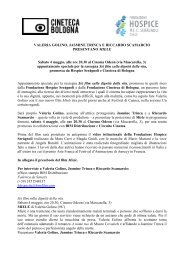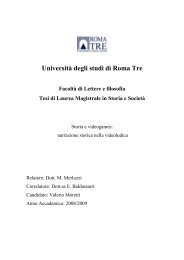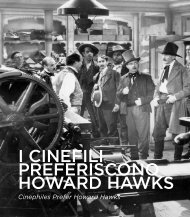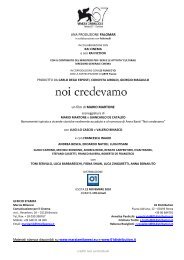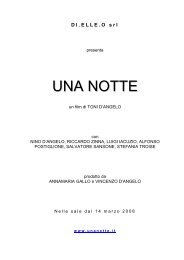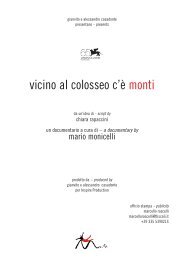Create successful ePaper yourself
Turn your PDF publications into a flip-book with our unique Google optimized e-Paper software.
Limelight. Il suo nome viene associato più raramente a quello<br />
del Maestro rispetto a quelli <strong>di</strong> Monta Bell o <strong>di</strong> Abba<strong>di</strong>e d’Arrast<br />
per la semplice ragione che Aldrich fu a sua volta un regista dalla<br />
forte personalità e dalla solida carriera. Alcuni dei suoi film sono<br />
però poco conosciuti, come nel caso <strong>di</strong> Twilight’s Last Gleaming<br />
(1977), un gesto <strong>di</strong> coraggio civile che mostra quanto Aldrich<br />
fosse vicino allo spirito democratico e combattivo <strong>di</strong> Chaplin.<br />
Resta aperta la questione che riguarda gli altri 357 giorni dell’anno:<br />
in futuro sarà ancora possibile vedere i film che abbiamo avuto<br />
il privilegio <strong>di</strong> ammirare? Quante persone li vedranno? Dove?<br />
Sarebbe sciocco e brutale pensare solo alle nostre esigenze e ai<br />
nostri privilegi <strong>di</strong> esperti proprio quando i giovani sono evidentemente<br />
più che mai ignoranti della storia del cinema (il che<br />
significa tra l’altro che i futuri cineasti partiranno da zero). Che<br />
paradosso: così tante opere a <strong>di</strong>sposizione, e non si è mai visto<br />
così poco.<br />
Ancora pochi anni fa sembrava una provocazione <strong>di</strong>re che i film<br />
35mm sarebbero stati un giorno relegati a eventi speciali che<br />
si sarebbero magari svolti una volta all’anno, come accade con<br />
i festival del cinema muto. Oggi quella possibilità è molto più<br />
vicina. La pellicola sta rapidamente scomparendo, e persino qui<br />
a <strong>Bologna</strong> possiamo toccare il futuro con mano, rendendoci concretamente<br />
conto <strong>di</strong> quante importanti compagnie cinematografiche<br />
presentino i nuovi restauri dei nostri amati classici in forma<br />
<strong>di</strong>gitale. A volte capita che ne venga prodotta anche una copia<br />
in pellicola, ma sta <strong>di</strong>ventando sempre più un’eccezione. La reazione<br />
alla metamorfosi della realtà materiale <strong>di</strong> un film è in parte<br />
un fatto generazionale. Per i più giovani la versione <strong>di</strong>gitale <strong>di</strong><br />
un ‘classico’ è un’esperienza del tutto naturale, mentre per un<br />
vecchio cinefilo – che magari ha visto quel film una ventina <strong>di</strong><br />
volte – la nuova forma esibisce certo un aspetto familiare, ma per<br />
l’essenziale è solo un’imitazione senz’anima.<br />
Una cosa è certa. I partecipanti del Cinema Ritrovato possono<br />
fare molto: abbiamo tra noi i migliori archivisti, esperti <strong>di</strong> restauro,<br />
storici, critici o semplicemente cinefili. Il destino del cinema<br />
e le nuove <strong>di</strong>mensioni della cinefilia verranno <strong>di</strong>scussi quoti<strong>di</strong>anamente<br />
nel corso <strong>di</strong> incontri con professionisti <strong>di</strong> vari settori. Le<br />
nostre presentazioni saranno al livello dei gran<strong>di</strong> film mostrati:<br />
Thelma Schoonmaker ci parlerà <strong>di</strong> The Life and Death of Colonel<br />
Blimp del marito Michael Powell, Jean Douchet <strong>di</strong> La Grande<br />
illusion, Kevin Brownlow <strong>di</strong> Lawrence of Arabia, Anouk Aimée<br />
e Agnès Varda <strong>di</strong> Lola. Aprirà la <strong>di</strong>scussione l’incontro con John<br />
Boorman, grande regista e ‘filosofo del cinema’, come <strong>di</strong>mostrano<br />
opere quali Deliverance, Hope and Glory e Point Blank, uno dei<br />
gran<strong>di</strong> eventi delle proiezioni in piazza.<br />
Speriamo dunque che l’esistenza e la <strong>di</strong>sponibilità <strong>di</strong> entrambe<br />
le copie – il <strong>di</strong>gitale <strong>di</strong>venterà probabilmente più frequente anche<br />
a <strong>Bologna</strong> – possa restare un nostro <strong>di</strong>ritto fondamentale. Altrimenti<br />
la possibilità <strong>di</strong> contare su una preziosa memoria collettiva<br />
verrà annientata. Ecco perché Il Cinema Ritrovato resterà un<br />
luogo in cui la saggia volontà <strong>di</strong> proiettare le copie originali sarà<br />
sempre rispettata.<br />
A tutti il nostro più cor<strong>di</strong>ale benvenuto!<br />
piazza will bear witness to that. We’ve also presented several of<br />
Chaplin’s close collaborators, and right now we add the name of<br />
Robert Aldrich, who was Chaplin’s assistant on Limelight. His<br />
name is more seldom associated with the Master than the names<br />
of Monta Bell or d’Abba<strong>di</strong>e d’Arrast for the simple reason that<br />
Aldrich made such a strong impact with his own career. But part<br />
of his career is little known – such as Twilight’s Last Gleaming<br />
(1977), an act of civil courage that shows how close Aldrich was<br />
to Chaplin’s fighting democratic spirit.<br />
The question about the 357 remaining days of the year may linger<br />
in our minds. Will it still be possible to see the films we have<br />
had the privilege to see in the past in the future? How many will<br />
see them? Where? It would be foolish and brutal to be concerned<br />
only with our own specialist needs and our privileged viewing<br />
when at the same moment young people are obviously more ignorant<br />
of film history than ever before - which means among other<br />
things that future filmmakers never started as much from zero as<br />
they do now. What a paradox: so much is available, but so little<br />
is actually seen.<br />
A careless joke was often repeated just a few years ago - that<br />
35mm films would someday be limited to specialty events, perhaps<br />
once a year, as is the case with silent film festivals now.<br />
Well, that scenario is much closer. Film is vanishing fast, and<br />
we are facing the future even here in <strong>Bologna</strong>: we can see and<br />
sense concretely how many lea<strong>di</strong>ng film companies are presenting<br />
their new restorations of our beloved classics in <strong>di</strong>gital form.<br />
Sometimes a restored film print will follow but that will probably<br />
become an ever rarer privilege. The reaction to the metamorphosis<br />
of a film’s material reality is partly a matter of generations. For<br />
younger eyes the <strong>di</strong>gital version of ‘classic’ works is an entirely<br />
natural experience while for an older cinephile’s sensibility - who<br />
might have seen that singular film 20 times - its renewed form is<br />
a pod, familiar, but basically an imitation without a soul.<br />
One thing is certain: there is enough power among the <strong>Bologna</strong><br />
participants to do a lot - we have among us the best archivists, restoration<br />
specialists, historians, critics and cinephiles tout court.<br />
The fate of cinema, as well as the new <strong>di</strong>mensions of cinéphilie,<br />
will be raised in daily <strong>di</strong>alogues where we can meet quite a few<br />
writers and people with ideas about what matters most in their<br />
field. Our film introductions will be on the same level as the great<br />
films: Thelma Schoonmaker on The Life and Death of Colonel<br />
Blimp, Jean Douchet on La Grande illusion, Kevin Brownlow on<br />
Lawrence of Arabia, Anouk Aimée and Agnès Varda on Lola. The<br />
opening <strong>di</strong>scussion will be with John Boorman, a great <strong>di</strong>rector<br />
as well as a ‘philosopher of film’ as a commentator, as shown by<br />
films like Deliverance, Hope and Glory or Point Blank, one of the<br />
highlights of our piazza screenings.<br />
So let’s hope that the existence and availability of both versions<br />
- <strong>di</strong>gital will probably increase in <strong>Bologna</strong> too - should remain<br />
our basic right as humans. Otherwise our chance of having a<br />
significant collective memory will be shattered. And that’s why Il<br />
Cinema Ritrovato will remain a place where the wisdom of projecting<br />
original film prints will always be respected.<br />
You are most cor<strong>di</strong>ally welcome!<br />
11



